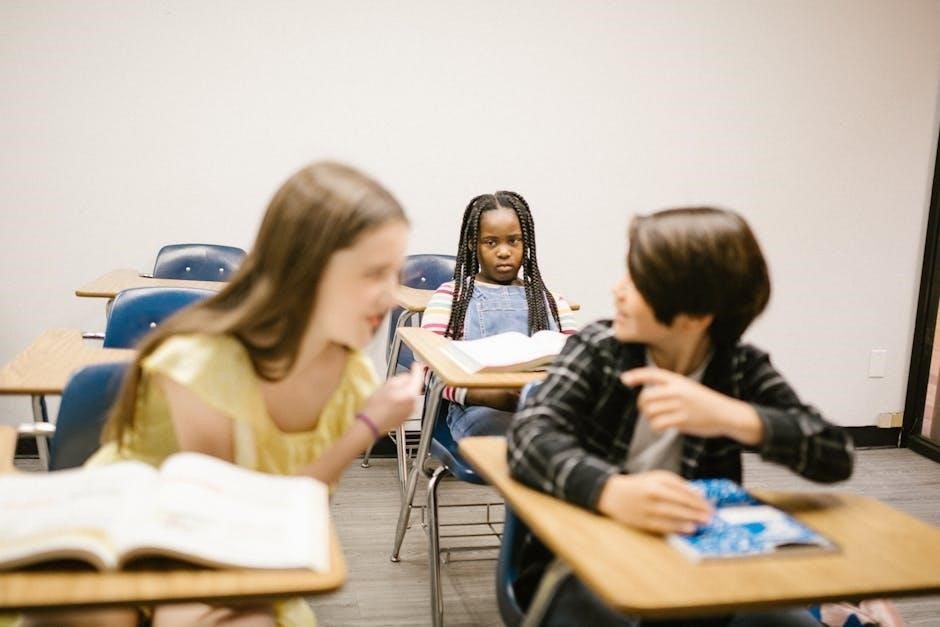The high school psychology curriculum introduces students to the scientific study of behavior and mental processes, aligning with national standards and emphasizing critical thinking, research methods, and real-world applications.

Definition and Scope of High School Psychology
High school psychology is a curriculum designed to introduce students to the scientific study of behavior and mental processes. It explores the biological, cognitive, and social factors influencing human behavior. The scope of high school psychology includes understanding key theories, research methods, and practical applications of psychological principles. Students learn about major subfields such as developmental, cognitive, and social psychology. The curriculum also emphasizes critical thinking, ethical considerations, and the role of psychology in real-world contexts, preparing students for further academic pursuits or vocational interests. By aligning with national standards, high school psychology courses provide a foundational understanding of human behavior and mental processes, fostering empathy and a deeper appreciation for individual and societal complexities.
Importance of Psychology Education in High School
Psychology education in high school is crucial as it provides students with a foundational understanding of human behavior and mental processes. It fosters critical thinking, empathy, and self-awareness, essential for personal growth and social interactions. By studying psychology, students gain insights into motivations, emotions, and decision-making, helping them navigate real-world challenges. The curriculum also enhances research skills and scientific literacy, preparing students for academic and professional pursuits. Recognizing psychology as a STEM subject further highlights its importance in developing analytical minds. Additionally, psychology education promotes understanding of diversity and mental health, fostering a more informed and compassionate society. It equips students with tools to address personal and societal issues, making it a valuable component of high school education.
Skills and Knowledge Gained Through Psychology Courses
High school psychology courses equip students with a range of skills and knowledge that enhance their understanding of human behavior and mental processes. Students develop critical thinking and research skills by learning to design experiments, analyze data, and interpret results. They gain an understanding of major psychological subfields, such as cognitive, social, and developmental psychology. Additionally, students improve their communication skills through discussions, presentations, and written assignments. Problem-solving abilities are strengthened as they apply psychological principles to real-world issues. The curriculum also fosters empathy and interpersonal skills, enabling students to better understand diverse perspectives. By mastering these skills, students are prepared for further academic pursuits and careers in psychology or related fields. The knowledge gained also supports personal growth, helping students navigate social and emotional challenges effectively.
Main Content Areas of the Curriculum
The high school psychology curriculum covers essential content pillars, including research methods, developmental psychology, cognitive processes, social behavior, and mental health, aligning with national educational standards for a comprehensive understanding.

Major Subfields of Psychology
High school psychology courses introduce students to the major subfields of psychology, including developmental psychology, which explores human growth and development across the lifespan, and cognitive psychology, focusing on mental processes like memory, learning, and problem-solving. Social psychology examines how social interactions influence behavior, while biological psychology studies the relationship between the brain and behavior. Additionally, the curriculum covers abnormal psychology, addressing mental health and disorders, and research methods, teaching students how to design and interpret psychological studies. These subfields provide a foundational understanding of human behavior and mental processes, aligning with national standards and preparing students for advanced studies or practical applications in psychology-related fields.
Developmental Psychology: Theories and Stages
Developmental psychology explores human growth and development across the lifespan, focusing on cognitive, social, and emotional changes. Key theories include Jean Piaget’s cognitive development stages (sensorimotor, preoperational, concrete operational, and formal operational) and Erik Erikson’s psychosocial stages, which emphasize identity formation and social roles. Lawrence Kohlberg’s theory of moral development highlights stages of ethical reasoning. These frameworks help students understand how individuals develop from infancy to adulthood. The curriculum also addresses contemporary research methods, such as longitudinal studies, to validate developmental theories. By studying these theories and stages, students gain insights into the complex processes shaping human behavior and mental growth, aligning with national standards for psychology education.
Cognitive Psychology: Memory, Learning, and Thinking

Cognitive psychology examines mental processes such as memory, learning, and thinking. It explores how information is encoded, stored, and retrieved through sensory, short-term, and long-term memory. The curriculum introduces the Atkinson-Shiffrin memory model and discusses strategies to enhance memory retention, such as chunking and elaborative rehearsal. Learning theories, including classical conditioning and operant conditioning, explain how behaviors are acquired. Critical thinking and problem-solving are emphasized, with techniques like cognitive restructuring and decision-making models. Students also learn about cognitive biases and heuristics, which influence reasoning. Practical applications, such as improving study habits and understanding misinformation, are highlighted. The section aligns with national standards, fostering a deeper understanding of mental processes and their impact on behavior.
Social Psychology: Human Behavior in Social Contexts

Social psychology explores how individuals’ thoughts, feelings, and behaviors are influenced by social interactions and contexts. Students learn about key concepts such as conformity, obedience, persuasion, and group dynamics, examining how societal norms and pressures shape behavior. The curriculum also covers topics like attitudes, stereotypes, prejudice, and altruism, providing insights into social issues and interpersonal relationships. Practical applications include understanding how to resist unwanted influences and foster positive social change. By studying real-world scenarios and psychological theories, students develop critical thinking skills to analyze social behaviors and their implications. This section of the curriculum aligns with national standards, encouraging empathy and a deeper understanding of human interaction in diverse social settings.

Research Methods in High School Psychology
Research methods in high school psychology teach students to scientifically investigate behavior and mental processes. The curriculum emphasizes understanding the scientific method, experimental design, and ethical considerations in research. Students learn to distinguish between different research techniques, such as experiments, surveys, case studies, and observational studies. They also explore concepts like variables, sampling, and data analysis, developing skills to critically evaluate research findings. Practical activities include designing simple experiments and interpreting data, fostering a deeper understanding of psychological principles. This section prepares students to apply research skills to real-world problems and think analytically about psychological claims. By mastering these methods, students gain a strong foundation for further study in psychology and related fields, while cultivating essential critical thinking and problem-solving abilities.

Learning Activities and Assessments
Learning activities and assessments in high school psychology include interactive exercises, project-based tasks, and varied evaluations like essays and objective tests, aligning with educational standards and fostering practical application of psychological concepts.
Interactive Activities for Engaging Students
Interactive activities are essential for engaging high school psychology students, fostering active learning and deeper understanding of concepts. These activities include role-playing, group discussions, and hands-on experiments that simulate real-world psychological phenomena. For instance, students might participate in memory experiments or analyze case studies to explore cognitive processes. Web Quests and library research projects encourage independent inquiry and critical thinking. Additionally, teachers often incorporate think-pair-share strategies and debates to promote collaboration and articulate reasoning. These activities not only make learning enjoyable but also help students connect theoretical knowledge to practical applications, enhancing their retention and interest in psychology. By aligning these activities with curriculum standards, educators ensure that students develop both conceptual understanding and essential skills in a dynamic and supportive environment.
Project-Based Learning in Psychology
Project-based learning in high school psychology encourages students to explore psychological concepts through hands-on, real-world applications. These projects are designed to align with curriculum standards and often involve long-term investigations of topics such as memory, social behavior, or developmental stages. Students are tasked with designing experiments, conducting research, and analyzing data to address psychological questions. For example, they might create case studies, develop surveys, or design interventions to understand human behavior. Projects foster critical thinking, creativity, and collaboration, as students work in groups to present their findings. Assessments include written reports, presentations, and reflections, ensuring students demonstrate both understanding and practical skills. By integrating project-based learning, educators help students connect theoretical knowledge to practical experiences, preparing them for further study and real-world applications in psychology.
Assessment Strategies for Psychology Courses
Assessment strategies for high school psychology courses are designed to evaluate students’ understanding of psychological concepts, theories, and research methods. Common approaches include essay exams, objective tests, and project-based assessments. Essay exams allow students to demonstrate their ability to think critically and apply psychological principles to complex questions. Objective tests, such as multiple-choice questions, measure recall and comprehension of key terms and concepts. Project-based assessments, like research papers or presentations, evaluate students’ ability to synthesize information and communicate their findings effectively. Additionally, formative assessments, such as quizzes and class discussions, are used to monitor progress and provide feedback; These strategies ensure that students not only master the content but also develop essential skills in critical thinking, problem-solving, and communication, preparing them for further academic and professional pursuits in psychology.
The high school psychology curriculum plays a vital role in fostering students’ understanding of human behavior, mental processes, and social interactions. By integrating scientific principles, real-world applications, and interactive learning activities, the curriculum equips students with essential skills in critical thinking, research, and problem-solving. It also encourages empathy and self-awareness, preparing students to navigate complex social environments and make informed decisions. The curriculum’s alignment with national standards ensures a comprehensive and structured approach, while its emphasis on STEM recognition highlights its scientific rigor. Ultimately, the high school psychology curriculum not only enriches students’ academic experiences but also empowers them to contribute positively to their communities and pursue further studies in psychology or related fields with confidence and curiosity.
